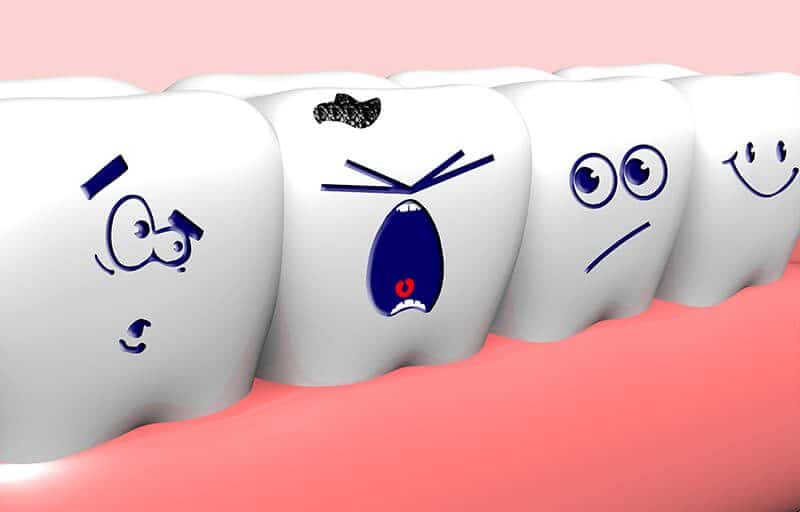When it comes to common dental concerns and emergencies, there are several that dentists routinely see come through their offices. If you’ve found yourself in a situation that’s causing pain or requires urgent care, knowing the first steps to take could save your smile (and help you avoid unnecessary expenses.)
Here are some of the most common dental injuries you should be aware of:
Knocked Out Tooth
An “avulsed” or “knocked out” tooth is one that is completely dislodged from its socket, root and all. If possible, locate the tooth and handle it only by the crown (touching or handling the root can dislodge the tiny fibers that aid in reattachment.) Gently rinse any debris off and then attempt to place the tooth back into the socket. If the injury has caused broken bones or the tooth cannot be reinserted, do not force it. Instead, put it in a sealed container and completely submerge it in milk, contact solution, or tap water (last choice.) Getting it to your dentist’s office within the hour is essential, as reinserting it within 1-2 hours post injury typically results in the best outcome.
Chipped Teeth
Chipped or fractured teeth are those that have any size portion break off, leaving the rest in tact inside of the mouth. As with a knocked out tooth, handle and store the broken fragment similarly. Your dentist may be able to physically bond the broken portion back into place. If not, composite bonding or a crown are usually the next two restorative options.
Dental Crown Fell Off
Crowns (sometimes called “caps”) can fall off at the most inopportune times, especially during meals. If your crown comes loose, attempt to lift it straight off of the tooth, so that you do not accidentally swallow it. Do not force it, if it feels only slightly loose then leave it alone.
Any loose crown or cap that falls off needs to be examined by your dentist at your earliest opportunity (if it happens on a weekend it’s ok to wait until Monday, unless of course, a front tooth is involved.) When crowns fall off it is usually due to the initial cement giving out or new decay developing underneath. If temporary cement was used, do not be alarmed.
If a front crown has fallen off or you’re in a situation that requires urgent attention outside of normal dental office hours, you can consider bonding your crown back in place temporarily with dental cement purchased from the drug store. Or, apply a small dab of toothpaste inside of the cap to create a suction to keep it in place for short-term purposes.
Broken Fillings
Old, or leaky fillings have a tendency to break out in large portions, sometimes taking extra tooth structure with them. This situation can place the remaining enamel at risk for breaking apart when you’re eating. Call your dentist to have the filling replaced as soon as you’re able to. It’s best not to delay treatment, as repairing the area can quickly progress into something more involved if it’s not addressed quickly (such as a crown or root canal.)
In the meantime, temporary filling or dental cement can be purchased at the drugstore to fill-in the space and prevent food from packing into the area. Be careful not to bite or chew on the tooth, using the other side of your mouth instead.
Oral Bleeding
The mouth tends to bleed heavily during injuries. Apply pressure with a clean gauze or washcloth to stop the bleeding. If you have tea bags on hand, consider using one of those instead (as the tannins aid in coagulation.) If bleeding doesn’t stop and is severe, head to the emergency room. Otherwise, speak to your dentist — especially if the bleeding is around an oral surgery site or where a recent procedure was performed.
Swelling (Around Tooth or Face)
Facial swelling can be quite severe when caused by abscessed teeth or other oral infections. Alternate cold and warm compresses every 20 minutes to reduce inflammation, and take an anti-inflammatory medication such as ibuprofen as directed. If an underlying infection exists and there are signs of redness or fever, speak with your dentist immediately or head to the nearest emergency room.
Saving on Your Emergency Dental Treatment
Having a dentist on your side can help you to avoid common dental injuries and unnecessary extensive treatment. But if lack of insurance is preventing you from getting the care you need, you may find that your smile has to suffer because of it.
Joining a dental savings plan like the ones at Aetna Dental Offers can give you extra discounts on routine services. Save 15-50% on emergency dental exams, treatments, and more. Talk to one of the savings experts today to find out if one of the discount options is right for you and your family.
Save 15% to 50%* at the Dentist
With an Aetna Dental Savings Plan.

